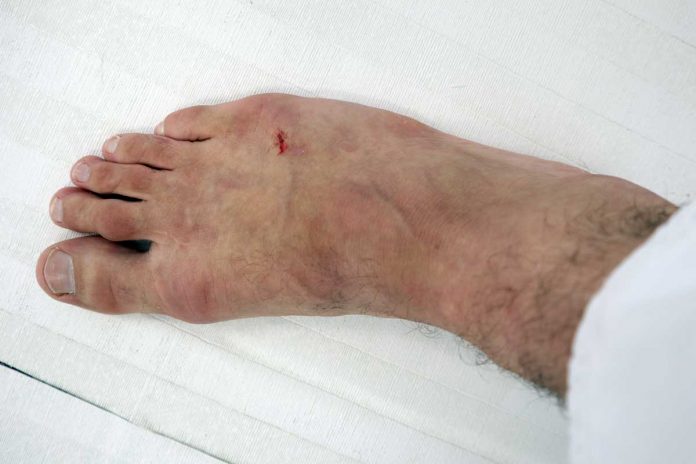
IF there is one thing grapplers fear, it is being ff the mats. The simple flu and most BJJ folks are going to act like is the end of the world and all their knowledge will disappear if they miss a couple of classes. Or, even worse, miss an open mat or two. I admit, despite preaching the opposite, I’m precisely one of these grapplers myself. It takes a debilitating injury to actually keep some off the mats. However, there’s a scarier thing than torn ligaments and twisted joints when it comes to Ji-Jitsu. BJJ Skin Infections are by far the thing grapplers fear the most, as they can keep you off the mats indefinitely. Of course, the effects on health come second to training. It is just how we are.
BJJ skin infections are usually not extremely serious. However, in certain situations, different things can contribute to some nasty diseases that might really derail someone’s BJJ journey. To that extent, the most talked-about ringworm can actually seem like a child’s play compared to some of these other skin infections. Staph is a huge and deadly serious one, which is why it’s going to get an article of its own. The ones that are serious enough to cause you real trouble and are quite common on the mats are psoriasis, impetigo, and herpes. And they’re all real and present threats that only require a little to rear their ugly microbial heads.
BJJ Skin Infections And The Issue Of Hygiene
Of course, the biggest thing that we’re actually going to start with is hygiene. It is baffling how people take such a common everyday thing like BJJ hygiene for granted. Ther are many aspects to BJJ hygiene and, unfortunately, you can’t trust people’s judgment in keeping it. This is what I’ve learned from personal experience. It takes one or two people to ruin everything you’re doing to fight and keep a gym clean. However, the good news is that once you make people pay attention to it, it quickly turns into a habit.
In those terms, you’ve got the trio of mat hygiene, personal hygiene, and the most often overlooked, dressing room hygiene. If you get all of them down, you’ll have no trouble with BJJ skin infections. That said, controlling individuals is still something you need to come to terms with. Some people just don’t really take care of hygiene and they need reminders. It is not that they’ll have pus dripping out of open wounds, but they might be unaware carrier of germs that can spread to others. Even worse, they can take up permanent residence on the mats.
Regardless of how much you try, things like moisture, ambient temperature, airflow, etc are always going to impact whether or not your mats can house germs. The short answer is that it doesn’t take a lot for fungi, bacteria, mold, or viruses, if not altogether, to form and stay under the mats or in corners. In fact, most of them are always there, but bad overall hygiene and a drop of immunity like during flu season can turn your gym into a “leper colony” if you’re not careful. And once you get such a reputation, you might as well close your gym.
Ringworm (Tinea corporis):
Ringworm is a fungal infection that you can see in every single gym. maybe not small gyms but it’s usually everywhere. The problem with ringworm is that it’s highly contagious and can spread quickly in BJJ due to the high amount of contact between practitioners. Once it gets in the gym it’s really hard to get rid of it. The other problem is it can be shared through contaminated equipment or mats. If you have a weightlifting room in your gym try to avoid it too if you have ringworm.
The good thing about ringworm is that it’s cleaned easily and is not dangerous at all. You just have to apply some creme 4-5 times a day (remember this 4-5 times) and in 4-5 days you’re usually good.
Psoriasis
Psoriasis is a very common skin condition that has a chronic The thing with this one is that it does not have microbes as an underline cause. It is the product of a much faster-than-usual life cycle of skin cells due to immunological reasons. That causes the cells to build upon the surface of the skin and form visible changes. As such, it has a chronic character and there’s no cure, although symptoms are quite easily manageable.
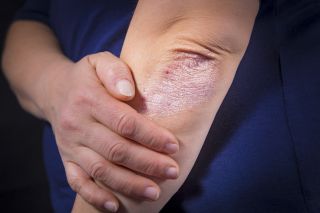
As far as grappling goes, psoriasis can be quite painful and cause lots of discomfort. Moreover, it is something that doesn’t exactly draw training partners to train with you and might damage someone’s confidence as a result. The big thing to remember is that other BJJ skin infections, like ringworm or impetigo, can act as triggers for psoriasis. Furthermore, people with psoriasis might end up a lot worse if they get exposed to other BJJ skin infections when training. The thing is that psoriasis is actually not transferable even though it looks quite similar to ringworm. As such, people with psoriasis are not a danger to others, and there’s no reason to expect them to cure it and come back. However, medications that can help symptoms are a good idea, in any scenario.
Herpes
Herpes is a viral infection that affects the skin. To be more precise, the exact name of the infection is Herpes simplex named after the virus that causes it. Basically, it is the same virus that causes cold sores. It is one of the most common BJJ Skin infections that can cause real problems among grapplers. In fact, there’s even such a thing as “wrestler herpes” which shows how common it can be in grappling martial arts. In fact, during one wrestling camp, more than half the participants ended up with symptoms of this infection. That’s how fast it can spread.
The disease presents as a rash with clusters of blisters that are pretty painful to the touch. AS such, it often prompts people to stay at home, simply because of the pain and tenderness. However, the issue with herpes is that you might be a carrier and spread it long before you show any symptoms. The rash is most often on the head, but can also spread across the torso and arms. There’s also a general feeling of feeling sick, with swollen lymph nodes and headaches. The infection usually goes away on it’s own, but it may come back. Treatment includes antiviral pills or creams as well as avoiding the gym, as the disease spreads very easily.
Solving herpes is actually extremely easy – it all boils down exclusively to hygiene. The symptoms are quite easy to notice since people can’t really cover up their face and head. Given that it is a virus, there are many possible complications, including triggering psoriasis or inviting others, mostly bacterial, BJJ skin infections.
Impetigo
The last of our BJJ skin infections for today is impetigo. This is one you might not have heard of, but it is right up there with the most common of grappling skin diseases. The culprit is actually staph, although not one that’s as dangerous as MRSA. In this case, it is mostly Staphylococcus aureus or Streptococcus pyogenes. Or both, if you’re really unlucky.
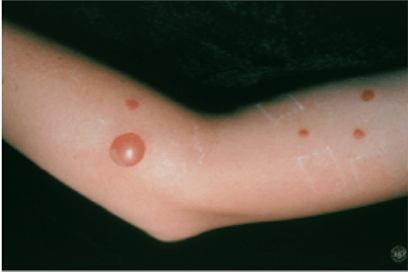
A word of caution
See a doctor. Do not attempt to solve common BJJ skin infections by yourself. One thing to consider is that not all over-the-counter creams might help resolve your problem. Furthermore, stick to proven medications, as Chad Mendes still claims that psoriasis medicine is to blame for a failed drug test in the UFC> That said, a bit more personal hygiene never hurts anyone. And finally, if you run into someone who has visible skin trouble, ask what it is. People with psoriasis are in no danger and there’s no need to treat them as lepers.


![Darce Choke Encyclopedia – Origins, Mechanics and Variations [2025] BJJ, choke, Brabo, BJJ Darce Choke, D'arce Choke, Darce BJJ Choke](https://bjj-world.com/wp-content/uploads/2017/11/JungPoirierLeeYahoo-218x150.jpg)






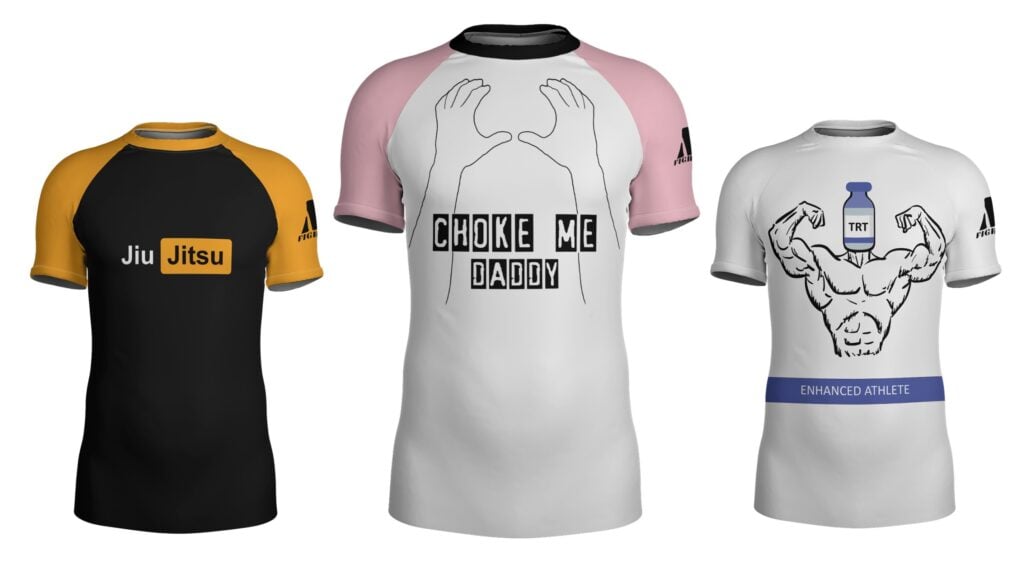
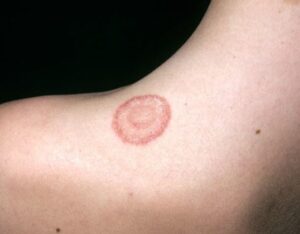




![Slicin’ Calves Mikey Musumeci DVD Review [2025] Slicin' Calves Mikey Musumeci DVD Review](https://bjj-world.com/wp-content/uploads/2025/04/slicin-calves-mikey-musumeci-dvd-review-218x150.png)
![Jiu-Jitsu For Old Guys Guard Retention Bernardo Faria DVD Review [2025] Jiu-Jitsu For Old Guys Guard Retention Bernardo Faria DVD Review](https://bjj-world.com/wp-content/uploads/2025/03/old-guys-guard-retention-bernardo-faria-dvd-review-218x150.png)
![X-Guard Trickery Kyle Sleeman DVD Review [2025] X-Guard Trickery Kyle Sleeman DVD Review](https://bjj-world.com/wp-content/uploads/2025/03/x-guard-trickery-kyle-sleeman-dvd-review-218x150.png)
![Countering with Crab Ride Anthony Budion DVD Review [2025] Countering with Crab Ride Anthony Budion DVD Review](https://bjj-world.com/wp-content/uploads/2025/03/countering-with-crab-ride-anthony-budion-dvd-review-218x150.png)
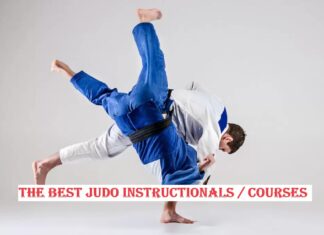

![Giancarlo Bodoni DVD Bundle Essential Connections Full Review [2024] Giancarlo Bodoni DVD Bundle Essential Connections Full Review](https://bjj-world.com/wp-content/uploads/2024/09/giancarlo-bodoni-dvd-bundle-essential-connections-100x70.png)

![The Whole Omoplata Enchilada Lyanne Perez DVD Review [2024] The Whole Omoplata Enchilada Lyanne Perez DVD Review](https://bjj-world.com/wp-content/uploads/2024/11/whole-omoplata-enchilada-lyanne-perez-dvd-review-100x70.png)

![Jeff Glover Deep Half Revolution DVD Bundle Review [2024] Jeff Glover Deep Half Revolution DVD Bundle Review](https://bjj-world.com/wp-content/uploads/2024/10/jeff-glover-deep-half-revolution-dvd-bundle-review-100x70.png)

![Assassin Choke Baret Yoshida DVD Review [2024] Assassin Choke Baret Yoshida DVD Review](https://bjj-world.com/wp-content/uploads/2024/10/assassin-choke-baret-yoshida-dvd-review-100x70.png)




![The Buchecha Gi Takedown System DVD Review [2025] The Buchecha Gi Takedown System DVD Review](https://bjj-world.com/wp-content/uploads/2025/01/buchecha-gi-takedown-system-dvd-review-100x70.png)
![Unpinnable Mount Escape Mastery Haleem Syed DVD Review [2025] Mount Escape Mastery Haleem Syed DVD Review](https://bjj-world.com/wp-content/uploads/2025/01/mount-escape-mastery-haleem-syed-dvd-review-100x70.png)
![Roger Gracie Closed Guard System DVD Review [2025] Roger Gracie Closed Guard System DVD Review](https://bjj-world.com/wp-content/uploads/2025/01/roger-gracie-closed-guard-system-dvd-review-100x70.png)


![Position And Submission Escapes Craig Funk DVD Review [2025] Position And Submission Escapes Craig Funk DVD Review](https://bjj-world.com/wp-content/uploads/2025/02/position-and-submission-escapes-craig-funk-dvd-review-100x70.png)


![No-Gi Defense Xande Ribeiro DVD Review [2024] No-Gi Defense Xande Ribeiro DVD Review](https://bjj-world.com/wp-content/uploads/2024/11/no-gi-defense-xande-ribeiro-dvd-review-100x70.png)

![Full Guard Formula James Booth DVD Review [2025] Full Guard Formula James Booth DVD Review](https://bjj-world.com/wp-content/uploads/2025/02/full-guard-formula-james-booth-dvd-review-100x70.png)

![Don’t Stand Up Chris Wojcik DVD Review [2024] Don't Stand Up Chris Wojcik DVD Review](https://bjj-world.com/wp-content/uploads/2024/11/dont-stand-up-chris-wojcik-dvd-review-100x70.png)
![Total Domination Top Control Mariusz Domasat DVD Review [2024] Total Domination Top Control Mariusz Domasat DVD Review](https://bjj-world.com/wp-content/uploads/2024/09/domination-top-control-mariusz-domasat-dvd-review-100x70.png)

